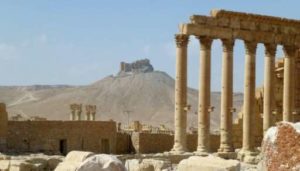by WorldTribune Staff, December 15, 2016
The U.S.-led coalition will defer to Russia in retaking Palmyra after Islamic State of Iraq and Levant (ISIL) regained control of the ancient Syrian city on Dec. 11.
“If they don’t, we will do what we need to do to defend ourselves and we’ll de-conflict those actions with the Russians,” Lt. Gen. Stephen Townsend, who commands the American-led coalition, said on Dec. 14 according to AFP.

ISIL took full control of Palmyra on Dec. 11 after temporarily being stopped by Russian forces.
Townsend also said that ISIL jihadists seized a trove of gear, possibly including anti-aircraft weapons, when they recaptured Palmyra.
“We believe that includes some armored vehicles and various guns and other heavy weapons, possibly some air-defense equipment,” Townsend said in a video briefing from Baghdad.
“Basically, anything they (ISIL) seize poses a threat to the coalition, but we can manage those threats and we will. I anticipate that we’ll have opportunities to strike that equipment and kill the ISIL that’s operating it soon.”
The Pentagon and coalition partners have accused Russia and Syria of neglecting ISIL’s threat to Palmyra to focus on bombing the former rebel bastion of Aleppo.
The U.S.-led coalition has not had an active role in Aleppo, and Townsend said the regime’s recapture of the city would have only a “relatively moderate” effect on coalition actions in Syria.
“Because I think the regime and the opposition forces that are fighting their war adjacent to ours will take their fight elsewhere,” he said without giving details.
Meanwhile, an arms research group said on Dec. 14 that ISIL was manufacturing weapons in and around Mosul on an industrial scale with products largely bought in bulk from Turkey.
London-based Conflict Armament Research said the terror organization maintained a “robust and reliable” supply chain between Turkey and Iraq that allowed jihadists to produce tens of thousands of weapons.
As Iraqi forces advance, ISIL is losing the physical capacity to manufacture weapons on an industrial scale, but the research group’s executive director, James Bevan, warned that highly trained fighters will take their expertise with them as they retreat.
“Given that this group is so organized, they clearly see the writing on the wall in Mosul,” Bevan told The Associated Press, saying he believes ISIL has already moved its highest trained bomb-makers out of Mosul and into Syria and southern Turkey.
“They place a very high value on technical capacity and they will do everything they can to preserve it,” he said.
